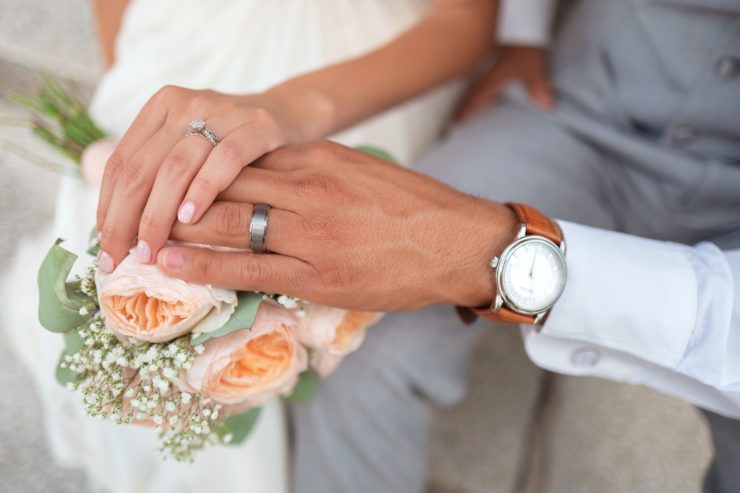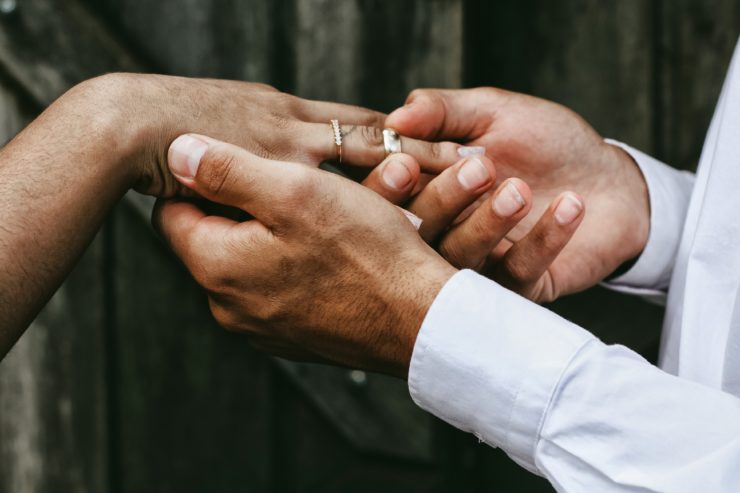
A lot of couples, particularly the grooms, find the most nerve-wracking and stressful part of the wedding ceremony to be the vows, especially if they are writing their own.
The exchanging of vows is meant to be a profession of love and admiration for both the bride and the groom-to-be on their wedding day. The traditional vows that many people are used to hearing (you know, the “for better, for worse, for richer, for poorer, in sickness and in health” kind) trace their origins all the way back to the 16th Century and Medieval England.
The Book of Common Prayer, which dates back to 1549, is where this particular wording of wedding vows comes from. However, wedding vows can be traced even further back to what is known as Sarum rite, a set of procedures following any kind of Christian public worship (think masses, liturgies, and weddings).
Thankfully, traditions are made to be  broken, and while many couples still choose to exchange the traditional pre-written vows on their wedding day, many others are choosing to write their own vows, as a more personal way to express their love for one another.
broken, and while many couples still choose to exchange the traditional pre-written vows on their wedding day, many others are choosing to write their own vows, as a more personal way to express their love for one another.
Take it from me, writing your own vows is definitely a bigger commitment than reciting the traditional wedding vows. But it doesn’t have to be scary and stressful like you think it’s going to be.
If you’re the groom and you’re planning on writing your own vows, here are a few tips that should make the process easier for you and more meaningful on your big day.
Keep It Short
Your vows don’t have to be the next great novel, nor do they need to be just a sentence or two long. There’s a happy medium that neds to be met when writing your vows. In all honesty, shorter is better (for the sake of the people in attendance. Most people don’t want to sit through a long wedding, and long vows that oftentimes can’t be heard by everyone will make it seem even longer.)
The perfect amount of words lies somewhere between 100 and 200 words; basically one or two paragraphs long.
Think of the Best Moments
You want your vows to reflect on the best moments of your time together: the heartfelt moments, the moments of weakness, of joy, and the laughs you’ve shared together.
A good mix of all of these things are a great way to convey the way you feel to your new brides. Throw in a funny moment somewhere in there as well!
(just…make sure it’s appropriate for mixed company).
Talk to Your Fiancée About Tone
Speaking of humor and funny moments, it’s a good idea to talk about your fiancée before the ceremony about the tone and humor in your vows.
Why? Well, for one important reason: you don’t want to emabarass one another in front of all of your friends and family on your wedding day due to someone’s vows being too humorous or too serious.
Vows don’t need to be a Southern Gothic novel, nor do they need to be your audition routine for a spot on the cast of Saturday Night Live.
Ask your fiancée about the tone of their vows, and let them know how you are going to present your vows. But don’t worry, your aren’t revealing your vows to them; you can easily discuss your tone without goingn into any details.
 Ask a Friend for Help
Ask a Friend for Help
Do you know someone that’s great with writing and grammar? Do you have a friend whose opinion you trust above all others?
It’s always a great idea to heave someone look over your speech before you present it in public, and the same goes for vows as well. Have a trusted friend look over your vows before your wedding, and ask them for any pointers if you’re having trouble expressing your feelings and putting them into words.
The exchanging of vows is one of the most intimate moments of your wedding ceremony. Make sure you have your vows perfect before the big day by following these simple, but effective, tips!






Leave a Reply